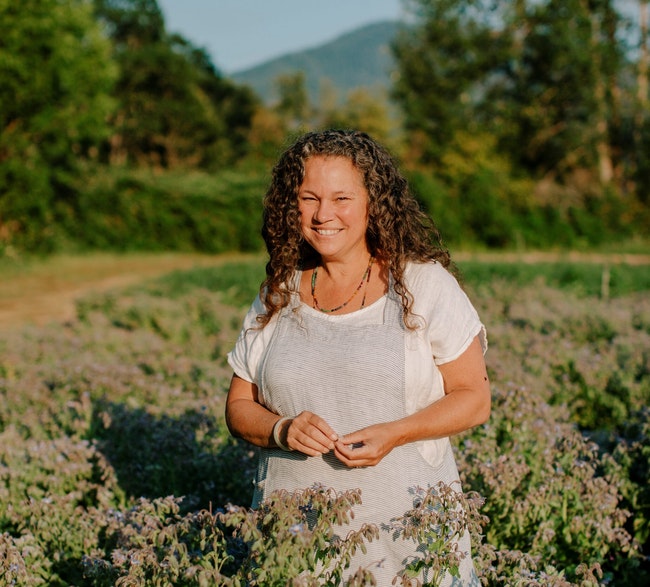 Elise Higley hopes to expand the sale of her tea blends in stores. (Elise Higley photo)
Elise Higley hopes to expand the sale of her tea blends in stores. (Elise Higley photo)
Emily Moore is a longtime professional chef, with French cooking school credentials and fine dining experience, who whips up tasty concoctions on her farm in Applegate.
She’d like to sell them to a wide market but she has one limitation: She’s not good at marketing.
Her fig compote draws rave reviews, she said, and her blueberry pickles are a hit at farmers markets. But she has her eyes on grocery stores.
“What I lack is marketing expertise and branding expertise,” Moore said.
So she applied for entry into a special food program that teaches women farmers or entrepreneurs how to market a food product. She’s among 24 women in Oregon chosen by the state Agriculture Department.
“What I’d like to do is to be able to have the products on the market and selling so that I can make a passive income,” Moore said.
The two-year program, which started last year, is designed for people who are just starting out or have small businesses. Participants can have no more than $500,000 a year in annual gross sales and cannot have more than 20 part-time or full-time employees over the year. They also have to sell a prepared product.
The program, which started in November and runs through March, consists of online classes on food safety, packaging, branding, marketing, testing and pricing.
The program is taught by experts from Oregon State University’s Food Innovation Center, the Union Kitchen Accelerator Program, Washington state Department of Agriculture and Nevada Department of Agriculture.
The women will also connect with other women entrepreneurs, farmers and food experts to exchange ideas and meet peers in other states. The state got a federal grant to cover costs of the program as did Washington state and Nevada.
That access is one reason why Elise Higley, who grows a variety of medicinal herbs with her husband Jeff on 145 acres, also in Applegate, is glad she got in the program.
“I’m really grateful to have access to so many different experts that we normally wouldn’t have access to or would have to pay a bunch of money for,” Higley said.
She grows 80 herbs, from camomille to yarrow to echinacea, that she sells in bulk to manufacturers. She also makes blends of loose teas that she sells under the brand Oshala Farm. She recently landed a deal to sell her teas with Market of Choice, a family owned grocery chain based in Eugene, and hopes the class will help her expand that part of her business.
“We want to learn how to be more efficient and productive,” Higley said.
Maria Rice, who specializes in salsa and pickles, took the class last year.
She said the program is comparable to a product development and marketing program at Portland Community College that costs $1,500. She could only complete half of the program because she had to switch her career from being an in-home caregiver to working full time for the state as a child welfare aide.
“I put my company production on hold until I can get enough money for a co-packer,” she said. “I just was overwhelmed working 50 hours plus and weekends in the kitchen or sales.”
She named her company Chow This! and plans to eventually resume sales.
She said she learned a lot in the program and connected with women farmers and entrepreneurs.
“If I had a chance to redo this program I would,” Rice said.
The program is geared towards farmers who turn crops into a product.
Timeri Hansen of Creswell hopes to learn in the program how to market jams and jellies made with the fruit that she grows. She’d also like to do something with her hazelnuts.
“I have so many ideas,” she told the Capital Chronicle. “Right now I’m in a tent by the side of the road.”
She’d like to build a farm stand in Creswell. She doesn’t have ambitions to create products for grocery stores or expand much. She said she’s happy selling to her community.
“A lot of people want to be in stores,” Hansen said. “I personally want to sell to my community.”
For more information about the program, check out its webpage.
Oregon Capital Chronicle is part of States Newsroom, a network of news bureaus supported by grants and a coalition of donors as a 501c(3) public charity. Oregon Capital Chronicle maintains editorial independence. Contact Editor Les Zaitz for questions: [email protected]. Follow Oregon Capital Chronicle on Facebook and Twitter.
STORY TIP OR IDEA? Send an email to Salem Reporter’s news team: [email protected].









